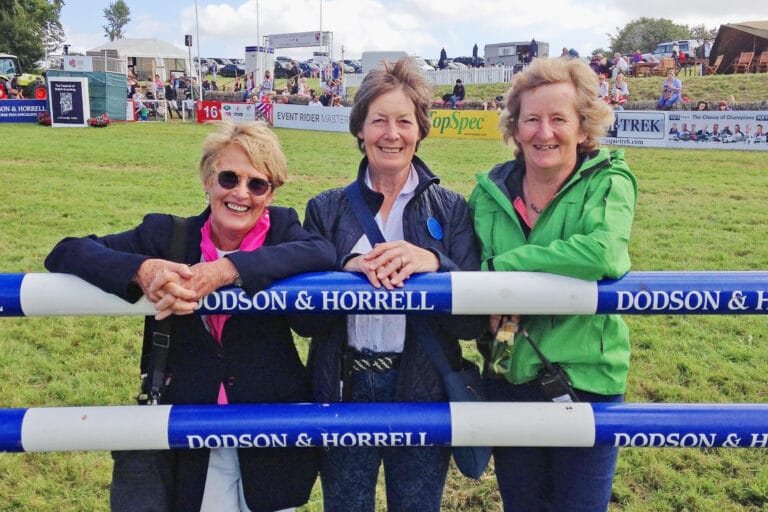Prue Spurrett is a respected National dressage judge, and now retired FEI 3* and 4* eventing judge. Her quiet competence has earned her a reputation as a valuable member of ground juries in Australia and internationally.
Q: Do you come from a horsey background?
A: Sort of! My first pony was a Shetland with attitude.
Q: When did you take an interest in horses and when did you learn to ride?
A: At about four when I was given Prinny. Not sure I learnt to ride on her as such – it was more about developing stickability.
Q: Which discipline appealed to you?
A: Several decades ago I joined Northside Riding Club at St Ives Showground in Sydney. That was the foundation of everything I’ve achieved in our sport. Northside was a multi discipline club, so we had a go at everything. We did the rounds of all the Show Dressage events, even Sydney Royal Dressage at the old Showgrounds – so cool! The friendships I made from those first days are still there today; that’s probably the best thing of all.
Q: Explain your role as an Equestrian Australia National Dressage Selector.
A: I’m the Reserve Selector, a new position created in case a situation arises in which there’s a real or perceived conflict of interest for any Selection Team member. Confidence in the process is a must for our members.
Q: You’ve been a volunteer as well as an official for many years. How did it all begin?
A: Back at Northside – from lugging around jumping poles and wings to measuring out arenas and sitting on the committee.

Judging Equestrian at the 2018 Asian Games in Jakarta.
Q: In what other areas have you been involved as a volunteer?
A: I became a zoo guide at Taronga Park. That was special, handing around Monty, the beautiful diamond python, in the show and tell sessions. Then I joined Lifeline as a shop volunteer and now Sallies in Forster.
Q: There seems to be a push to actively recruit dressage competitors to help out. Is this due to riders not putting up their hands to volunteer?
A: It is tough – time’s the enemy. I know what it’s like floating your horse to a comp, you’re tied up as much as your horse. Even so, please try to help out. Just ask, even if it’s taking water around to the judges in the cars – that will be someone the organising committee doesn’t have to find.
Q: Do you recall the first time you officially judged a test? How did you feel?
A: Daunted – but no matter if it’s the first Prep to that first International at Hartpury! Andrew Nicholson was circling the arena and all I could think of was: ‘If they could see me now, that little gang of mine’ from Sweet Charity!” The quality of judges’ training here is universal. It will take you anywhere – and that builds confidence in using the whole range of marks – the scariest part is probably when you see your first 10 – and instinctively know to give it!
Q: Have you ever been confronted by an irate rider displeased with your marks?
A: No. Riders will always query if there’s a difference in judging marks, they have the right to do so – we’re not infallible.
Q: When and why did you switch to judging eventing dressage?
A: I was asked and soon came to appreciate the training of eventers – the mental agility and physical fitness to switch tack through three disciplines and the partnership with the rider. When it pays off we end up with those Olympic medals, and a partnership like Andrew Hoy and Vassily de Lassos.
Q: Some say eventing dressage is judged differently, perhaps more leniently, because the horses are conditioned to cope in a demanding sport and can be somewhat exuberant on the first day. Is that so?
A: No way! The Training Scale rules whatever the sport – rhythm, suppleness and contact. Impulsion, straightness and collection will get you around the 20 x 60, across six kilometres cross country, and over any size triple bar.
Q: What’s the funniest thing that’s happened to you when officiating?
A: A car pulling up alongside me at C because they wanted to be ‘close to the action’. That was a classic.
Q: What’s your favourite horse-oriented novel?
A: Horse Heaven by Jane Smiley.
Q: Do you have a favourite horse movie?
A: Several but can’t go past National Velvet by a short half head from Ride Like a Girl.
Q: You’ve judged at many international events – are there differences in the attitude towards equestrian sport from the general public in these various countries?
A: The crowds! The Festival of British Eventing at Gatcombe Park in Gloucestershire gets 30,000 – and about the same number of dogs! Similarly with Tattersalls International, Dublin, and the atmosphere is wonderful (the Pimms helps!).
Q: What changes, if any, would you like to see made in Australian dressage?
A: Just keep to the Training Scale, see more arena craft in action, and more PBs achieved across the board. There aren’t any short cuts – they just lead to short careers.
Q: What changes, if any, would you like to see made in Australia eventing?
A: I’m now retired from international judging but, going by Tokyo, when you are on to a good thing, stick to it.
Q: You now live in Forster on the mid-north coast of NSW – are you involved with horses there?
A: Absolutely! Manning Valley Dressage & Hacking Club and Alexander Park draw on riders from the Hunter, New England and North Coast. There is always a great roll up at their events.
Q: Is there anything horse-related you would like to try but haven’t yet?
A: Carriage driving.
Q: Is there one aspect of equestrian sport about which you are not particularly fond?
A: Early morning starts.
Five extra Q&As
Q: A little bit about your involvement in the Sydney 2000 Olympics and the loan horse to Japan’s Paralympic team.
A: That was Northern Advocate, my grey Anglo/Warmblood. We were accepted by Team Japan and I’d been fluent in Japanese so it didn’t take long to get back up to scratch. A lot of great memories and just so proud to have been amongst it all with my horse.
Q: It would seem the most successful Australian dressage riders are those who are based overseas and/or have access to generous funding. Do you think this will always be the case?
A: These days the competition bar is raised at every major event. To achieve par with the internationals we need to be amongst peer players in their own backyard – our eventers know this. There are multiple available CDIs in Europe – whereas here you can count them on one hand. Having said that, look at the champions we’ve produced here that have had us on our feet at CDIs – it’s the ‘small pool/big pond’’ thing, and we have the horses more than capable of delivering internationally.
Q: What horse sports or pursuits would you like to see banned?
A: The welfare of the horse must be paramount – it’s in our DNA. As long as that overrides everything, equestrian sport will continue. Horses are bred with speed and strength and it’s the harnessing of these that give the public their heroes, think Black Caviar or Valegro. It’s our responsibility to guard our horses against anything that endangers that goodwill.
Q: Do you have a favourite breed?
A: Who doesn’t love a Thoroughbred?
Q: You gave a world record dressage score at an international event in 2015. Tell us more.
A: That was at Camphire (Ireland) in the CCI2* – Chris Burton and Santano 11. Three 10s in the test and the rider score had to be a 10. It was magic to judge. My co-judge’s first words in the break were: “I gave some 10’s did you?” Des Hughes was TD and he double checked the papers before telling us we’d given an FEI 2* record score.
Feature Image: Prue (L) with members of the 2016 Gatcombe Horse Trials Ground Jury.



